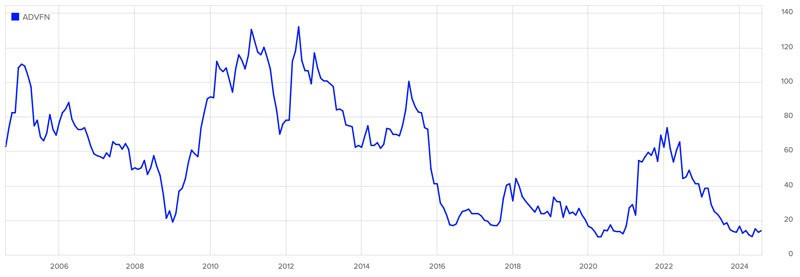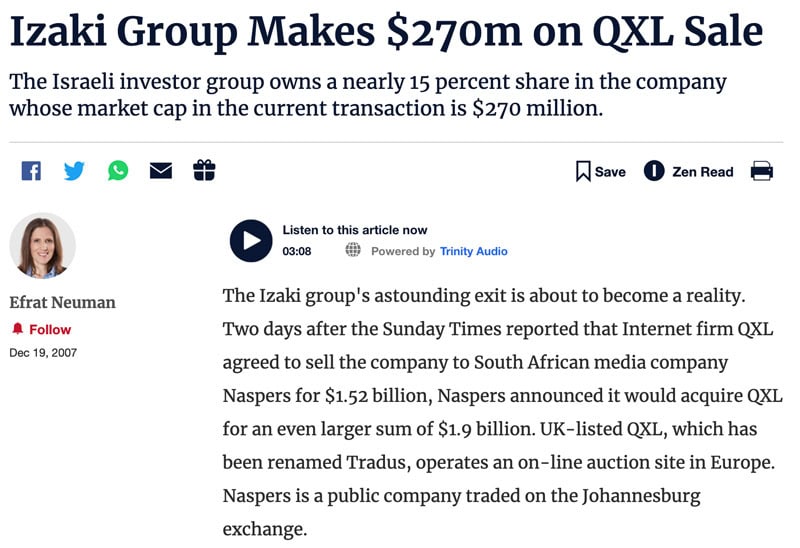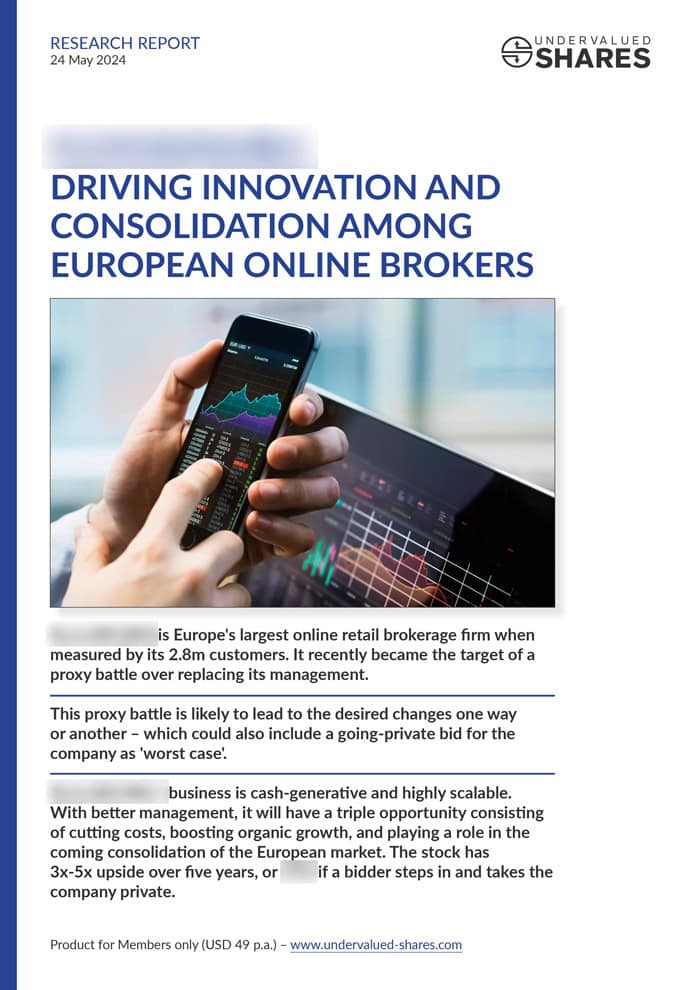An online financial information company with millions of users would normally have a market value in the tens, if not hundreds of millions.
Not ADVFN.
The company has about 5m users, but its market cap is a paltry GBP 6.5m.
In fact, its market cap is just a smidgen higher than its net cash reserves. The users are currently valued at less than a pound each.
This has attracted a group of Israeli tech entrepreneurs who come with an extraordinary track record in investing. The same group once built a large stake in another British Internet firm that had fallen on hard times, and in just a few years they made 10x their money on USD 25m.
Will the new investors manage to turn ADVFN into an even more astounding home run?

ADVFN.
ADVFN's history in a nutshell
London-listed ADVFN (ISIN GB00BPT24C10, UK:AFN) is one of the world's largest online financial information providers.
When it started in 1999, it had a simple but important ambition: to level the playing field for retail investors by providing access to information that was previously the preserve of institutional investors and professional traders. ADVFN was first in the UK to make "Level 2" market data available to retail investors.
The company went public in March 2000, at the very peak of the dotcom bubble.
Anyone who invested then lost 99% of their investment in the space of a few years. The information that ADVFN provided was a boon for private investors, but for its shareholders it produced nothing but losses – with one exception.
ADVFN's CEO, Clem Chambers, only owned a small stake in the company, but he managed to make himself the prime beneficiary. In between salary, travel expenses, and equity options, Chambers made a decent living off the company. He even managed to secure himself a contract with a three-year (!) notice period. This was probably unique among publicly listed British companies, and an effective poison pill for anyone who dared challenge his position. It summarised what a self-service shop ADVFN was for its management team.
I met Chambers once, over a decade ago. Despite my natural tendency to look for the good in anyone, he was one of the few characters whom I instantly disliked – a lot!
I've been following ADVFN's developments ever since.
It's a tiny company with limited free-float, which is why few others paid attention. ADVFN last properly made it into the news in the mid-2010s when a group of Israeli investors tried to wrestle control of the company.
In 2015, two shell companies, Sweet Sky Limited and Shellhouse Limited, declared a holding of over 25%. They requisitioned an extraordinary general meeting of shareholders and suggested to defenestrate the management.
The Israeli investors backing the attempt had not done their homework. ADVFN itself was not a regulated firm, but it owned 100% of ALLIPO, an FCA-regulated business. As such, anyone buying more than 10% of ADVFN had to get FCA approval before surpassing this threshold.
Even though the Israeli reportedly had the backing of 40% of the share capital, Chambers was able to fend off the shareholder revolt. The brokerage custodians acting for the group decided not to proceed with the requisition for a general meeting, and instead advised the Israelis that they had breached multiple FCA regulations. The putsch was over before it had even begun.
The market briefly anticipated change, driving the share price from 60 pence to 100 pence. A year later, it was trading as low as 16 pence. It stayed around this sell-out level until 2020, when the Israelis re-emerged from the shadows.
Following further re-arranging and building their stakes, the activists once again stepped forward in early 2022 to demand changes to the board. This time, they had done their homework. The incumbent board decided that it was best to negotiate a deal and move on.
Chambers agreed to step down in exchange for two years' worth of salary in cash and stock, and a consulting agreement. The Israelis underwent compliance procedures and got board representation. The second putsch attempt succeeded without a single shot fired.
With new management in charge, it begs the question…
Who are the Israelis?
Little is known publicly about the new investors who are now in charge of ADVFN. Most of what’s in the public domain relates to their previous involvement with QXL, a former publicly listed online auction house and one of the original Internet wonder stocks.
QXL floated in the early 2000s alongside other famous names such as lastminute.com and Scoot.com. It was also the inaugural British member of what was then called the "99% Club", named to recognise dotcom companies that had lost 99% of their value since going public. In the short space of just eight months after the IPO in April 2020, QXL's market cap sank from GBP 2bn to almost nothing.
QXL survived the subsequent funding crisis, and parts of its business thrived. In 2004, its management tried to take advantage of the beaten-down stock price and launched a management buy-out, offering shareholders GBP 7 per share. Florissant, the venture capital firm backed by Icelandic entrepreneur Björgólfur Björgólfsson, stepped in with an offer of GBP 14. Björgólfsson's attempt failed because a group of Israeli investors built a stake of 26% and drove the price up to GBP 16.
The Israelis believed there was much more value left in QXL, and kept buying more shares, even at a price of GBP 30. The following year, QX's share price rose to GBP 120.
In late 2007, QXL was taken over by Naspers, Africa's largest media group, for GBP 946m. The Israelis had a 10x on their investment and walked away with a cool USD 270m.

Source: Haaretz, 19 December 2007.
Only limited information is available about who backed the transaction involving QXL, but some names did make it into the public domain – such as Ron Izaki or Izhaki (his name was spelled one way during the heydays of the QXL deal and is now spelled another way in the filings for ADVFN). The Financial Timesonce described him as a "real estate developer". Izhaki today holds 6.48% of ADVFN.
Another key figure is Yair Tauman, who may well have instigated the entire affair. Tauman had first become a non-executive director of ADVFN in 2010. A professor of economics at The State University of New York and an expert on game theory, he had made money as co-founder of Bidorbuy.com, then Africa's largest online auction site. Tauman stepped down from his position in 2014 when the activists first demanded changes, but returned to the board in 2022. He today holds 9.18%, while his son and ADVFN CEO, Amit Tauman, owns another 11.82%.
Another investor associated with the group is Dan Horsky, who owns 8.85% of ADVFN.
Clem Chambers' holding company, Blockchain PLC, is currently listed on the ADVFN website with a 6.63% stake. However, recent regulatory disclosures show that Blockchain PLC has already sold off parts of its stake and now only owns 4.95%.
Given their previous tussle with FCA regulations, the market has not yet given the Israelis much credit for taking control of ADVFN. Currently trading at 14 pence, the stock is down massively since it peaked at 75 pence in early 2022 when headlines about Chambers' resignation appeared. Remarkably, it's also down a lot since a share placement at 33 pence in January 2023. The new investors had agreed to back a GBP 6.8m share issue at the price, to give ADVFN the necessary financial manoeuvring room to implement changes.
Given ADVF's tiny size and how all parties involved handled themselves at some point in the past, it'd be easy to ignore all of these developments. ADVFN is not conventionally investible.
However, there are too many aspects that make it worth a closer look.
E.g., there is the fact that between 2000 and 2008, Dan Horsky managed to increase his personal investment portfolio from USD 500,000 to USD 80m (i.e., 160x), primarily on the back of being an early investor in QXL. (Horsky then took his portfolio to USD 220m by 2016 but eventually got done for tax evasion, as described in this US government filing.)
Clearly, these Israeli investors are no muppets.
Of late, they even have the support of a former executive of eToro, the UD 3.5bn social investment platform that also came out of Israel.
ADVFN's offering in a nutshell: data, chat, advertising
ADVFN still operates an information platform for private investors.
As the corporate website describes it, "ADVFN Plc provides comprehensive global stock, crypto, forex and commodity market information to the private investors in the UK, US, Brazil, Italy and other international retail markets. It offers a unique environment for premium data where financial advertisers and companies engage directly with a huge active audience of investors."
ADVFN's service attracts 34m unique global users per year, with 10m+ monthly visitors generating over one billion page impressions every year. Based on a mixture of subscription fees and advertising income, ADVFN's roughly 35 staff generate about GBP 5.5m in annual revenue.
ADVFN had long had one of the most atrocious-looking websites of the finance world, and its revenue is barely enough to keep the lights on. Then again, the Israeli investors seem to have spotted an opportunity that excites them. After all, they have now been involved with the company for ten years already. You don't stick to a labour-intense investment for that long unless you believe that you are onto something big.
5m registered users on a platform that offers financial information is a tremendous asset, and it begs to be exploited in a more efficient way.
As a mere example, if ADVFN's new management got 1% of the registered users to sign up to a monthly subscription product that costs GBP 10 per month, that alone would double the company's annual revenue. Given the digital nature of the business, much of such additional revenue would go to the bottom line.
The scalability of this type of business is tremendous.
Just as much, the new investors seem to have punchy ambitions. In the 2023 annual report, the firm's new CEO closed by saying:
"In 2024 we plan to introduce a new product which we believe is going to revolutionise the way our users consume financial information, utilise our existing community and tools in different ways."
To get there, Tauman first had to carry out extensive restructuring. Overcoming the legacy left behind by the reign of Clem Chambers involved:
- Reshaping the board structure and related activities, which incurred legal expenses of GBP 200,000.
- Addressing outdated infrastructure and the risks associated with old hardware.
- Resolving "complexities" with the joint venture in Brazil.
- Winding down non-core operations.
To get the business to move forward, ADVFN also:
- Invested in high-capacity, low-latency data processing to improve site stability.
- Expanded its product offering through the launch of real-time option data and option flow product, new and unique editorial content, comprehensive global fundamental data for relevant markets, and the revamp of the InvestorsHub message board.
- Optimised the ad tech operations.
- Streamlined the funnels for user engagement and monetisation.
- Integrated advanced analytics into the operations.
- Reduced operational costs by 20% while onboarding new senior team members.
What about this "new product that will revolutionise the way the users consume financial information"?
ADVFN had promised to have its new app ready by the end of Q2/2024. In its most recent corporate update published in early July 2024, it had to admit that the plan has now shifted to the end of Q3/2024.
Without a doubt, though, the company has made tremendous progress already, as outlined in its recent update:
"Revamping the ADVFN offering, including the redesign and mobile optimisation of the website, is phased as follows:
- Phase 1 completed: The first phase of the Platform updates, which includes most of the core tools and pages ADVFN offers and ADVFN AI Intelligence, is now live on advfn.com;
- Phase 2 initiated: We have commenced the rollout of these enhancements to additional countries, with completion anticipated in the Autumn; and
- Long Tail Redesign: Upon the conclusion of Phase 2, we will proceed with a comprehensive update of the remaining sections of the platform.
- We have also successfully integrated advanced analytics into our operations, significantly enhancing our data-driven decision-making capabilities.
- Optimisation and monetisation efforts are underway, with the primary objective of increasing our subscription base."
Of late, this progress has started to attract a different kind of talent, such as Shalom Berkovitz, former Chief Financial Officer and Deputy Chief Executive of eToro, who was appointed ADVFN’s non-executive director in June 2024.
The writing on the wall is clear: the Israeli investors now in charge of ADVFN have the experience, the network, and the resources to create something big. After ten years of efforts, they'll want to see their investment become a home run similar to QXL.
What's an investor to do?
ADVFN is a most peculiar opportunity.
With a market cap of currently GBP 6.5m, it is barely trading on par with its cash reserves of GBP 4.8m.
Its 5m registered users are almost given away for free, as is the rest of its web traffic.
Then again, ADVFN has been bleeding money of late. In the six months that ended 31 December 2023, it lost GBP 0.5m. Cleaning up legacy issues, investing in new systems, and cutting off some existing product categories cost the company dearly. In 2023, revenue sank by 30%, from GBP 7.8m to GBP 5.5m.
Does the new team have what it takes to turn ADVFN into a new company altogether?
Based on results so far and with the recent impressive addition to the board, ADVFN may now turn the corner.
Could this be a 100-bagger one day?
Given the global footprint of its business, the scalability of the business model and the players involved, ADVFN could have the potential for something remarkable. After all, ADVFN is able to speak to FIVE MILLION investors – and that's just the ones who have registered. Just think how much it would cost to recreate such a user base from scratch. The replacement value of the existing system sure is a lot higher than the current market cap.
It's too early to produce any estimates, but the current share price seems remarkably low. After all, in January 2023, the new investors were entirely content to add millions to their investment by subscribing to more stock at a price of then 33 pence. Right now, the share price is trading at not even half that.
Normally, such a micro-cap would barely deserve featuring, given the limited trading activity. However, of late, larger amounts of stock have become available, as Clem Chambers has been reducing his stake that he held indirectly as CEO of Blockchain PLC. In June 2024, Blockchain PLC reportedly reduced its stake from 6.63% to 5.91%, followed by a further reduction to 4.95% in July 2024.
Blockchain PLC's public filings reveal a challenging financial situation. According to the annual report as of June 2023, "there is material uncertainty that may cast doubt over the Group's ability to continue as a going concern", and "the Group's and Company's ability to continue as going concern is dependent on the cashflows from sale of shares in AVDFN Plc and ability of the Group to raise additional funds."
The remaining stake in ADVFN held by Blockchain PLC translates to about 2.3m shares (out of 46m) or about GBP 300,000 worth of shares. Whether Blockchain PLC remains in the market as a seller right now cannot be known for sure. Now may be an opportunity to build a small position, though.
If the Israelis are only half as successful as I think they plan to be, even holding a GBP 5,000 stake could one day add up to serious money. If anything, the stock should be trading at least at the 33 pence level at which the share issue took place – or higher, given the progress made since then.
It's a strange story, and the loss-making company with its quirky band of renegade investors is not without risk. It'd be difficult to refute, though, that a global investor platform with 5m registered users couldn't be turned into something much more valuable.
The ONE German activist case you need to know about
Cases of successful shareholder activism are rare in Germany – but they do exist!
In May 2024, an Undervalued Shares research report on a proxy battle in Germany predicted that the company's largest shareholder was going to push through major change.
In the meantime, that shareholder – also the company's founder – succeeded with ousting the CEO and joining the board.
Which definitely makes this investment worth another look!
The ONE German activist case you need to know about
Cases of successful shareholder activism are rare in Germany – but they do exist!
In May 2024, an Undervalued Shares research report on a proxy battle in Germany predicted that the company's largest shareholder was going to push through major change.
In the meantime, that shareholder – also the company's founder – succeeded with ousting the CEO and joining the board.
Which definitely makes this investment worth another look!
Did you find this article useful and enjoyable? If you want to read my next articles right when they come out, please sign up to my email list.
Share this post:









